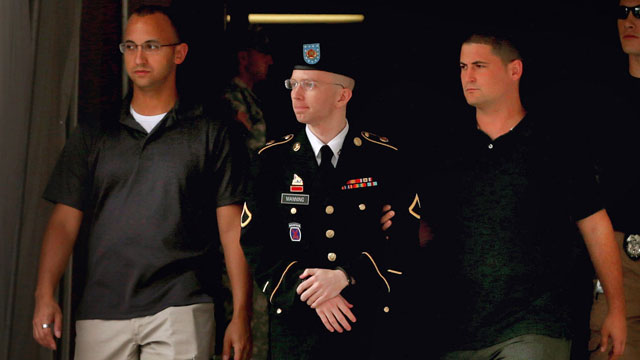Prior to the Obama Administration, there have been only three known cases in which the Espionage Act was used to prosecute government officials for leaks. The most well-known of these was the conviction and death sentence of Julius and Ethel Rosenberg in 1951 for their alleged involvement in sharing defense secrets with the Soviet Union.
The current administration has brought a total of seven cases under the Espionage Act, more than any other president combined. The most recent charges are against NSA leaker Edward Snowden.
What did Manning actually do?
He shared a huge amount of classified defense information in what is considered the biggest government leak in U.S. history.
While serving as an Army intelligence officer in Iraq in 2010, Manning had access to U.S. government databases used to transmit classified information. He acknowledged leaking more than 700,000 battlefield reports and diplomatic cables to WikiLeaks. The files included evidence of roughly 15,000 unreported civilian causalities in Iraq, as well as dossiers on men being held without trial at Guantánamo Bay, Cuba. The bundle also had video footage from 2007 of a U.S. helicopter attack in Iraq that killed civilians, including two Reuters journalists who were mistaken as combatants.
Manning downloaded the documents on a rewritable CD labeled “Lady Gaga."
Months later, after a computer hacker turned him in, Manning was arrested and held in military detention facilities until his court-martial in June.
Why does Manning say he did it?
He said he wanted to "spark reform" and provoke debate about the U.S. government’s military actions and foreign policy decisions.
In Manning's own words:
"With my insatiable curiosity and interest in geopolitics I became fascinated ... I came to the conclusion that this type of information should be made public."
If the American public "had access to the information ... this could spark a domestic debate on the role of the military and our foreign policy in general."
"In attempting counterinsurgency operations, we became obsessed with capturing and killing human targets on lists." The cables "documented backdoor deals and criminality that didn't reflect the so-called leader of the free world."
"I believed these cables would not damage the United States. However, I believed these cables would be embarrassing."
What are the main arguments for and against Manning?
The Manning case has inspired very strong public reaction. Some consider him a hero and martyr, others a traitor to his country. His supporters argue he exposed government wrongdoing, shared information with the media that the public had a right to know about and debate, and did little to compromise national security.
His detractors counter that in sharing military documents, he blatantly broke the law, violated his oath and loyalty to the military, indiscriminately exposed valuable classified information that benefited foreign adversaries and directly threatened U.S. security.
Some of the key statements made in court by the lead defense and prosecution :
Defense attorney David Coombs:
"Is Pfc. Manning somebody who is a traitor, has no loyalty to this country or the flag, and wanted to systematically harvest and download as much information as possible for his true employer, WikiLeaks? Is that what the evidence shows? Or is he a young, naive, good-intentioned soldier ... whose sole focus was maybe, 'I just can make a difference, maybe make a change?'"
Major Ashden Fein, lead military prosecutor:
"Manning had the general evil intent ... He acted voluntarily and deliberately with his disclosures. He was not a whistle-blower. He was a traitor."
What happens next?
The sentencing phase of Manning's trial begins today (Wednesday). He will get credit for his 1,162 days of pre-trial confinement. He will also be credited an additional 112 days for harsh treatment while being held in a Marine Corps brig. The sentencing process, which includes more than 20 scheduled witnesses for both the defense and prosecution, could last for weeks. Within the military justice system, there are no sentencing guidelines or minimum sentences. If Manning is sentenced to more than a year of confinement, his case will be immediately appealed to the Army Court of Criminal Appeals (where the same judge was recently promoted). His appeals could conceivably continue for years.
